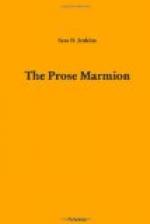We now return to Lord Marmion, who, led by the Palmer, was hastening on to Holyrood. When the heights of Lammermoor were reached, noon had long passed, and at early nightfall, old Gifford’s towers lay before them. Here they had expected hospitality, but the lord of the Castle had gone to Scotland’s camp, where were gathered the noblest and bravest of her sons. No friendly summons called them to the hall, for in her lord’s absence, the lady refused admittance alike to friend and foe.
On through the hamlet rode the train until it drew rein at the inn. Now down from their seats sprang the horsemen. The courtyard rang with jingling spurs, horses were led to the stalls, and the bustling host gave double the orders that could be obeyed. The building was large, and though rudely built, its cheerful fire and savory food were most welcome to the weary men. Soon by the wide chimney’s roaring blaze, and in the place of state, sat Marmion. He watched his followers as they mixed the brown ale, and enjoyed the bountiful repast. Oft the lordly warrior mingled in the mirth they made.
“For though, with men
of high degree,
The proudest of the
proud was he,
Yet, trained in camp,
he knew the art
To win the soldier’s
hardy heart.
Boisterous as March,
yet fresh as May,
With open hand and brow
as free,
Lover of wine and minstrelsy.”
Directly opposite, resting on his staff, stood the Palmer, the thin, dark visage half seen, half hidden by his hood. Steadily he gazed on Marmion, who by frown and gesture gave evidence that he could ill bear so close a scrutiny.
As squire and archer looked at the stern, dark face of the Pilgrim, their bursts of laughter grew less loud, less frequent, and gradually their mirth declined. They whispered one to another: “Sawest thou ever such a face? How pale his cheek! How bright his eye! His heart must be set only on his soul’s salvation.”
To chase away the gloom gradually stealing over the company, and to draw from himself the sullen scowl of the Palmer, Marmion called upon his favorite squire:
“’Fitz-Eustace,
knows’t thou not some lay
To speed the lingering
night away?’”
The youth made an unhappy choice. He had a rich, mellow voice, and chose the wild, sad ballad often sung to Marmion by the unfortunate Constance de Beverley. When all was quiet, quiveringly the notes fell upon the air:
Song.
“Where shall the lover
rest,
Whom the
fates sever
From his true maiden’s
breast,
Parted forever?
Where early violets
die
Under the
willow.
“There through the summer
day,
Cool streams
are laving
There while the tempests
sway,
Scarce are
boughs waving;
There thy rest shalt
thou take,
Never again to awake,
Never, O
never!




